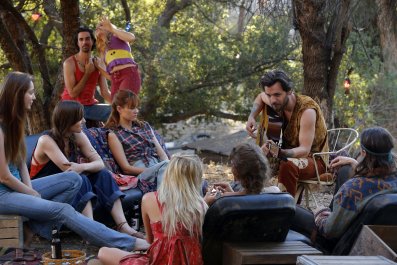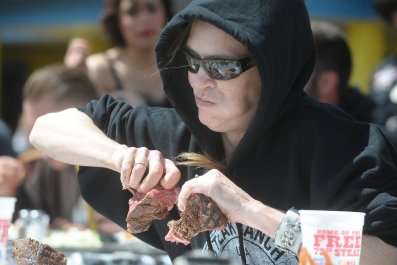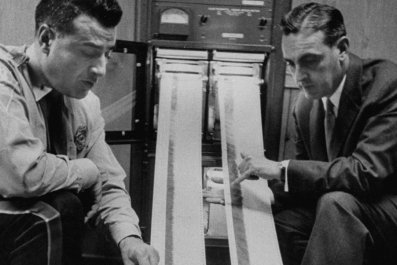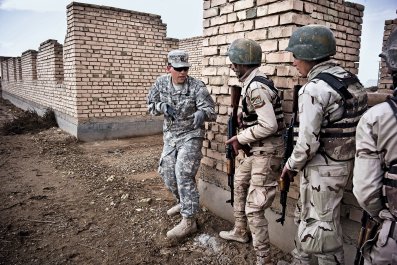Republican presidential candidates gathered last month at the Oklahoma City Cox Conference Center, just a few blocks from the site of what was the Alfred R. Murrah Federal Building. Two decades ago, anti-government militia sympathizer Timothy McVeigh blew it up in what he called an act of war against the U.S. government. It was the worst crime of domestically bred terrorism in American history. McVeigh was executed in 2001, but since then, some of his militia ideals have gone mainstream and even been introduced as laws in many states, including Oklahoma.
Legislators in dozens of states have submitted proposals to nullify or block federal laws—a longtime goal of militias. These have included exempting states from federal gun laws and educational standards, as well as, of course, Obamacare. That doesn't make these anti-federal statutes part of McVeigh's madness, but Republican politicians now often echo conspiracy theories once relegated to troglodyte pamphlets. And several states have passed laws making gold a currency—a step toward returning to the gold standard—even though currency is a federal responsibility.
When Cliven Bundy engaged in an armed standoff with Bureau of Land Management agents in 2014, after a federal court order demanded he get his cattle off federal land, as he hadn't paid grazing fees for 20 years, several of the current Republican presidential candidates sided with the outlaw. As armed militia members converged in Nevada to protect Bundy, Senator Ted Cruz of Texas called the events "the unfortunate and tragic culmination of the path President Obama has set the federal government on." Rick Perry, then the governor of Texas, said: "I have a problem with the federal government putting citizens in the position of having to feel like they have to use force to deal with their own government." Mike Huckabee opined: "There is something incredibly wrong when a government believes that some blades of grass that a cow is eating is [such] an egregious affront to the government of the United States that we would literally put a gun in a citizen's face and threaten to shoot him over it."
Tarso Ramos, executive director of Political Research Associates, which tracks right-wing extremism, says these and other formerly fringe ideas mainstreamed after McVeigh's assault—just not right away. "The Oklahoma City bombing had a sobering effect for a while," he says. "Then, with the election of Obama, you get a whole new wave of Patriot activity and a new variant of conspiracy-ism, including the birther stuff and the idea that Obama is an agent of powerful elites."
The surge in fringe activism was so dramatic after Obama's election that the Department of Homeland Security issued a warning in 2009 predicting that right-wing extremists would multiply and "the consequences of their violence [could be] more severe." The report was withdrawn after a conservative outcry.
Militia sympathizers today have the ears of many Republican politicians. Texas Governor Greg Abbott vowed to keep watch on the U.S. military this spring as it runs a series of war games called Jade Helm 15. Some Texans sensed an armed federal takeover of the Lone Star State and demanded action. Senator Cruz said of their fears, "I understand the reason for concern and uncertainty, because when the federal government has not demonstrated itself to be trustworthy in this administration, the natural consequence is that many citizens don't trust what it is saying."
The nullifiers fear Washington and the United Nations. Anti-U.N. anxiety dates back to the John Birch Society, but today some of those doing the raving are lawmakers. State legislators and local officials have passed dozens of laws barring implementation of Agenda 21, a nonbinding 1992 U.N. white paper about environmental sustainability. President George H.W. Bush and the leaders of 177 other nations signed it.
Twenty years later, the Republican National Committee in 2012 denounced Agenda 21 in a resolution as a "destructive and insidious scheme" that would impose "socialist/communist redistribution of wealth." Cruz, a presidential candidate, claims Agenda 21 would "abolish" golf courses and paved roads. Last year, Oklahoma lawmakers passed an Agenda 21 nullification law.
Conservatives are also using the 10th Amendment—which reserves powers for the states not mentioned in the rest of the Bill of Rights and the Constitution—to audaciously challenge federal authority. In 2004, a Montana gun enthusiast named Gary Marbut found another use for the 10th Amendment: pushing a bill exempting guns manufactured and retained in Montana from federal regulation. The bill became a law in 2009 called the Firearms Freedom Act, which declared that federal gun laws did not apply. A half-dozen other states soon followed suit. A survey by ProPublica in 2012 found that 37 states have since passed laws circumventing federal gun laws and 12 states are considering so-called Second Amendment Preservation Acts, which would nullify federal gun laws altogether. In some cases, the state laws have criminalized federal agents who try to enforce the federal laws. Versions of that twist passed in Kansas, Alaska and Idaho.
Besides freeing guns from Washington's control, there are also bills nullifying Obamacare, the National Security Agency and Common Core, as well as federal laws on other environmental standards, marijuana and tracking license plates. The federal government is "diving off into areas unchecked that they're not supposed to be involved in," said Montana state Representative Krayton Kerns, who introduced a bill in 2013 to limit the ability of local police to help enforce federal laws. "Not only is it our right in state legislatures to do this, it's our obligation to do it," Kerns told NBC News. "Somebody's got to put a 'whoa' on it." Oklahoma Attorney General Scott Pruitt is such a nullification enthusiast that he created a separate "Federalism Unit" devoted to fighting federal government "abuses of power."
Oklahoma joined Utah and Arizona last summer in giving a glimmer of hope to fans of another goal of the militia world—returning America to the gold standard. In 2014, Oklahoma made it law that "gold and silver coins issued by the United States government are legal tender in the State of Oklahoma." Similar proposals are being pushed in at least a dozen states.
When I asked Oklahoma Governor Mary Fallin about the gold currency law she signed, she deferred to her press secretary, Alex Weintz. He later emailed to say the governor's counsel reads the law as one that would help gold investors—not necessarily promote the use of gold as money. But Michael Boldin, founder of the libertarian Tenth Amendment Center, writes that by passing the law, Oklahoma "took the first step towards following the tender requirements of the Constitution and nullifying the Federal Reserve's near-monopoly on money."
There are some intriguing similarities between the current political climate and that of the mid-'90s, when McVeigh gathered up the fertilizer for his Ryder truck bomb. Back then, as now, a Democratic president presided over an improving American economy, and his popularity provoked the fear and loathing of an edge of the right-wing political spectrum contemplating—and occasionally engaging in—armed resistance.
Then, as now, the number of anti-government armed resistance groups was at a watermark high. According to the Southern Poverty Law Center (SPLC), the amount of "Patriot" militias peaked at 858 in 1996, just after McVeigh killed 168 people, including children, in the heart of Oklahoma City. The militia tally fell almost immediately—a consequence, analysts say, of shame over the horrific act, followed by new fears of Islamic terrorism, which in the minds of some militia members made the American government look like the lesser of two evils.
Then came Obama. Since his election in 2008, the number of anti-government extremist groups tracked by the SPLC has risen to another record high, 874.
Ramos says he and his colleagues believe the difference now is that fringe rage is being channeled into a larger right-wing populist movement. "The Tea Party represents this coalition between those working in the formal system and those focused outside—white nationalists who depict Obama with a Hitler mustache," Ramos says. "What's happening now is a little hard to say, but there are strong indicators that the forces that redirected a lot of that energy into the formal arena of politics do not hold the sway that they once did. The ability of formal politics to deliver sufficiently to appease the most hardline elements at the base almost never succeeds in the long run."
To suggest that today's tyranny rhetoric bears any link to McVeigh-style violence provokes outrage among conservatives, and Wichita State University political scientist Neal Allen, who has studied nullification laws past and present, says the politically active new-model nullifiers do differ from their anti-government precursors. "There is a lot of distance between Timothy McVeigh and attempts by state government to block or limit federal power, not least because Timothy McVeigh was coming from a clearly racist position," he says.
Allen says the problem with the GOP's absorption of extremist rhetoric and goals is not that it encourages the violent, but that it obstructs the normal ebb and flow of politics. When politicians court a base that believes the federal government is the enemy, it becomes nearly impossible to negotiate. Judging by the gridlocked committee rooms of the Capitol, that metaphorical truck bomb has already detonated in the heart of the American political process.

















